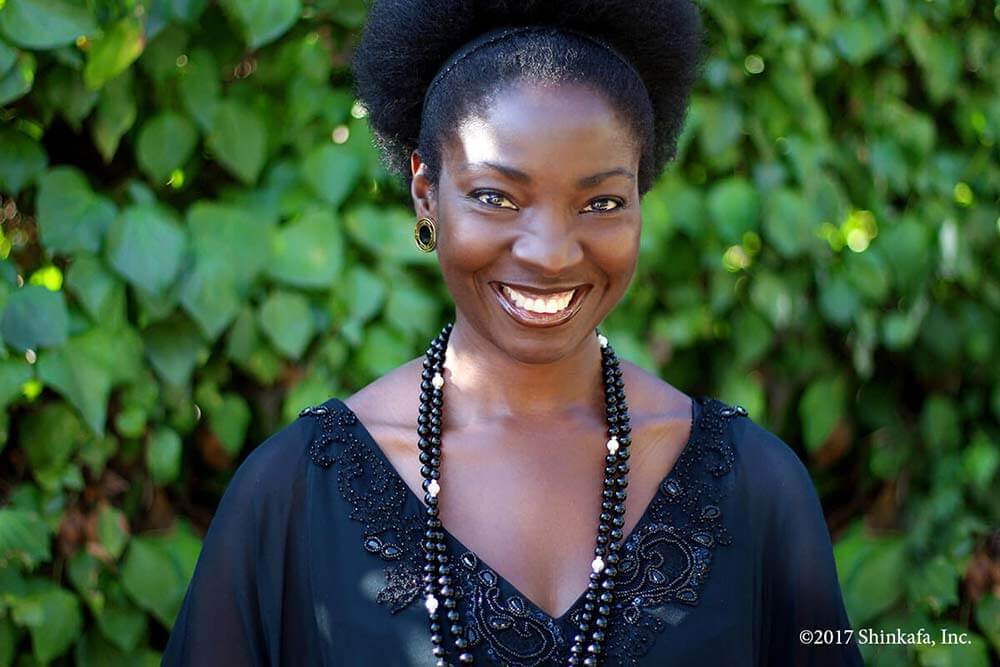
By Ngozi Bolin, Founder, Shinkafa Inc.
At Shinkafa, we believe that taking a holistic approach to our skin care and hair care should be the gold standard.
This means that we must take into account what we eat, what we breathe, the topical applications we put on our skin or hair, our environment, our external and internal stressors, as well as our mental and spiritual health.
Our physical appearance is the first impression we make upon contact with other persons. Perceptions of us are shaped by several factors including our apparent age. This can be good or bad depending on the circumstance or culture you are dealing with. It is doubtful, however, that anyone would consider looking older than their numerical age to be a compliment. Aging skin shows itself in many ways: wrinkles, patchy skin, uneven pigmentation, crêpe skin, sagging skin, sallow complexion and skin, dry, ashy and bumpy skin. Aging hair shows itself as brittle, thinning, lifeless, dull, weathered, dehydrated and breaking hair.
So, what are the factors that contribute to skin aging, aging hair or premature aging and what can we do about them? This article does not and must not substitute or supplant the advice, diagnosis and treatment you receive from your medical professional, but should give you instead an overall lay person’s understanding of why someone might look way older than their actually are. We will consider some of the more common factors that help cause, enhance or increase risk factors for aging and premature aging of the skin and hair. And we will discuss sun damage, stress, alcohol, diet, collagen, exercise, harmful chemicals, weight fluctuation, hydration, harsh skin care, smoking, medication, soap, sleep deprivation and a strong healthy skin as a first line of defense against premature aging.
Mother Nature and Man-Made Aging Factors

Sun Damage
The sun is crucial to our survival, food, health and eradication of certain diseases like rickets and tuberculosis. We need the sun for photosynthesis and photolysis. Yet we must pay enough respect to the awesome powers of the sun to know when our bodies have amassed beneficial sun exposure. The damage by the sun can continue hours after exposure to the sun. It is estimated that 90 percent of skin aging is caused by sun damage. That is a staggering number. Regular sunscreen use retards skin aging in healthy, middle-aged men and women. According to the Skin Cancer Foundation’s compilation of data on skin damage attributed to the sun, people “who use sunscreen with an SPF of 15 or higher daily show 24 percent less skin aging than those who do not use sunscreen daily.” It is important to note that only a fraction of sun damage is accumulated by adulthood, because sun damage is cumulative. Which means that there is always time to change course, start healing and be more proactive in protecting against sun damage.
This by no means suggests that we should turn into vampires and avoid the sun at all cost. Not at all. We love the sun, particularly, because of it being a magnificent source of vitamin D. We have written about the benefits of vitamin D. The vitamin D you get from the sun lasts twice as long as the vitamin you get from your supplement. While you must use a strong sun protection when you intend to be in the sun for long, we continue to emphasize the use of daily skin and hair care products that come with natural sun protection factor daily. The more natural the sun protection, in our opinion, the better.
Hydration
Hydration, by far, goes hand in hand with dry skin and other dehydrated skin and hair conditions that include rosacea, psoriasis, eczema, cracked skin and dry, dull, breaking and brittle hair. To combat dehydration one must increase intake of fruits and leafy vegetables and stay well-hydrated, reduce intake of coffee and tea and drink plenty of water. We generally recommend that people moisturize daily for proper hydration of the skin and to avoid sagging and premature aging of the skin and for a flowing, soft, glowing healthy hair. For this group, they must moisturize daily with creams or oils as opposed to lotions, and avoid sulfates, soaps or alkali-based washes.
The good news in hydration is that with the proper products, a non-permanent wrinkle can be improved or disappear, especially wrinkles around the eyes and lips. However, once a wrinkle has settled in, you just have to find a way to love that wrinkle. It is worthy to note that in 2006 the International Journal of Cosmetic Science in Liège, Belgium identified four different kinds of wrinkles: atrophic crinkling rhytids which come from squinting and disappear once the skin is stretched; permanent elastotic creases (you don’t want these); dynamic expression lines that come from repeated facial expressions and can become permanent; and finally, gravitational folds that occur with age and sag.
If you love your tea or coffee, you should also take pains to drink water after drinking either as they can be quite drying to the skin.
Collagen
Collagen is the connective tissue fiber that gives our skin its elasticity. It is in our skin, joints, tendons, blood vessels, bones, muscles, ligaments, teeth and eye cornea. It is the most abundant protein in our body. As we grow older, we break down collagen faster than our bodies can replace them. As we age, we also make low quality collagen and in some cases our bodies stop producing collagen altogether, leading to sagging loose skin, dry crêpey skin, shrinking and weakening muscles, joint pain and wrinkles. Bad habits like smoking and poor diet also speed up the breakdown of collagen. That is why you will find most smokers with thinning, wrinkled and damaged skin around the mouth, especially.
There are some procedures that your medical professional, usually a dermatologist or plastic surgeon, may recommend, to replace collagen. However, we believe that the first option should be to take steps to combat the depletion of collagen before it gets to a breaking point. These steps require incorporating smart changes into our daily lives, including eating foods like bone broth soup, lean meats, fish, beans, and white eggs which are very high in two amino acids: lysine and proline, which are great building blocks of our natural collagen; vitamin C which you can get from citrus fruits, tomatoes, green and red peppers, winter squash, leafy greens; and find plant based protein sources. At Shinkafa, we have not researched collagen supplements and thus are unable to offer suggestions there, except to note that such supplements do not require regulatory approval before being sold to the public. So, caveat emptor.
Harmful Chemicals
Harmful chemicals include a great number of unpronounceable ingredients that contribute nothing to the health of your hair or skin. They look and sound fancy, but what on earth do they do? At Shinkafa, we have asked whether you know what is in your products? Read up on that article to re-familiarize yourself with certain ingredients to avoid in your products. Some of these ingredients have even been banned in many countries, including hydroquinone, mercury and all bleaching agents. There are some chemicals which are necessary to treat certain skin conditions that may include these ingredient, but their use is handled under medical supervision and not as over the counter cosmetics. Even under such medically prescribed use, it is important to avoid using them for a prolonged period of time.
Here, we’d like to dedicate some space to highlight some of the consequences of prolonged use of corticosteroid creams. Corticosteroid creams are used as the first line of treatment for psoriasis and eczema. According to the National Eczema Association, topical “corticosteroids withdrawal (“TCW”) (sometimes called “topical steroid addiction” or “Red Skin Syndrome”) appears to be a clinical adverse effect that can occur when topical corticosteroids are inappropriately used or overused, then stopped. It can result from prolonged, frequent, and inappropriate use of moderate to high potency topical corticosteroids, especially on the face and genital area, but is not limited to these criteria.” TCW occurs once the body achieves Topical Steroids Addiction (“TSA”) which happens when your entire bodily function becomes reliant on the powerful steroids that have been prescribed for you.
Dermatitis published a paper in August 2018 captioned, “Steroid Withdrawal Effects Following Long-term Topical Corticosteroid Use” that lays out some of the effects of long term use of topical corticosteroid use, but conclude that uniform diagnostic tools are not currently set. Their study, thus, seeks to aid in establishing proper diagnostic criteria for TSW by including the following as relevant indicators: history of atomic dermatitis, history of topical corticosteroid use, prednisone use, burning on skin, skin sensitivity to previously tolerated products and clothing, oozing skin, shedding, elephant wrinkles, hair loss, sleep disturbance, pain, papules and pustules, depression, fatigue, among others.
Not everyone on steroid cream has these adverse reactions, but for those that do, the consequences can be debilitating, both physically and emotionally. In most cases, it has the insidious effect of robbing one of self-confidence. For those dealing with TCW, we offer the following suggestions: First, take steps to remove stress from your working environment. Second, get a doctor you trust to help you navigate pain management, prevent infections due to the raw open cracked skin, itch management, anxiety and possible use of immunotherapy. Third, understand that your body is going through a brutal healing process following discontinuation of very powerful medication. Help your body and mind with a clean diet, good gut health and fermented foods. Fourth, eat foods or supplement for vitamin C, zinc, vitamin D and Magnesium. Magnesium is especially effective at pulling moisture and minerals into the gut to aid bowel functions. Fifth, for topical care, avoid harmful chemicals and alcohol in your products. Charcoal is your friend as are products with ferments. Charcoal body wash and charcoal shampoo are helpful. Find a good hydrating healing moisturizer and oils.
Harsh Skin Care
Anything that causes the skin to be irritated, inflamed or traumatized is most likely going to lead to the aging of the skin. This also includes any skin care products prescribed by dermatologist that sting, burn, irritate or aggravate skin conditions. They include harsh chemicals, alcohol, perfumes,
When washing and cleansing the skin, avoid over-cleansing. Avoid harsh sulfates. Use a soap-less soap. That is to say, use cleansing products without alkali, sulfates and paraben. Find a good charcoal body wash, if you desire a deep cleansing, otherwise a gentle moisturizing body wash is recommended for daily washing.
There are those that really love their many skin care products. Less is better. All that scrubbing and cleansing in your younger years will bring the grim reaper later on. Reduce the use cleansers and scrubs. Instead opt for gentle body wash to cleanse, remove makeup and environmental factors.
Medication: Magnesium Deficiency
Some medications can lead to signs of aging. For instance, corticosteroid creams, lotions and pills can lead to stretch marks as they restrict the skin’s ability to stretch. Under this heading, we want to bring one particular element to your attention, viz; magnesium. It is the eleventh most abundant element in the human body by mass and is vital to all cells and some 300 enzymes in our body. It is estimated that most of us are magnesium-deficient. Symptoms of magnesium deficiency include muscle twitches, tics (especially in children), cramps, tremors, mental disorders, osteoporosis, fatigue, muscle weakness, constipation, stress, anxiety, depression, low energy, calcification of the arteries, stress acne and wrinkles. Speak with your medical professional to check your magnesium levels and see if supplements or change in diet will be helpful.
Soap
Soap, no matter how it is made, is a mixture of alkali and oil. Alkali is harsh. It is highly effective in degreasing our pots, pans, plates and toilets, but, should not be used consistently on the skin. Used consistently on our skin and hair, it leads to major signs of aging. It guarantees a squeaky-clean skin and hair, but also strips them of valuable natural skin oils, interfering with the skin’s suppleness and elasticity, and leading to the acceleration of fine lines.
Life Choices and Situational Aging Factors

Stress & Depression
Stress is a killer! It is incredibly toxic to our health and to the skin and hair, and can lead to premature aging of the skin and hair. A study conducted by Brigham and Women’s Hospital suggests that anxiety is a possible risk factor to accelerated aging. Stress has been known to accelerate hair loss, albeit in some cases temporarily. It is important to manage our stressors and find time to decompress. According to a March 23, 2011 study, chronic stress leads to ageing. The study finds that “[D]epression is associated with an unusually high rate of aging-related illnesses and early mortality.” The study concludes that this aging may progress in proportion to lifetime depression exposure.
It is important for us to find ways to manage stressors and depressive triggers in our lives. Seek help when appropriate. Do not suffer in silence as you are shortening your life daily. Find your inner happy self and let it shine. De-clutter your life, your mind and spirit. What is the quality of your friendships? Do you invite strife and stress into your life? Forgive, so that you can heal. Say goodbye to the negative bonds that hold you back. You will be lighter and will not miss them. Bring light into your life. Find balance to your energies and chakras. Read, turn off electronics, meditate, take a walk, find and get in touch with your quiet, happy, confident, inner self by finding the spiritual you.
Sleep Deprivation
We all know and feel the effects of not sleeping well in one night. We feel slow, cranky and unproductive. Imagine the effect of sleep deprivation over a lifetime. In the wonderful 2017 article published by MDedge aptly named, “Beauty sleep: Sleep deprivation and the skin,” the authors conclude that the effects of sleep deprivation include swollen, sunken eyes, dehydrated skin, interference with immune response, wound healing, collagen production, uptick in inflammation, leading to outbreaks of acne, eczema, psoriasis and skin allergies. A new preliminary study published on October 16, 2019 in Nature International Journal of Science seems to suggest that excessive neural and cortical activity in the brain is linked to aging. Sleep deprivation does not just affect the skin, but affects our cognitive functions. The authors of a magnificent 2014 paper published by the National Institutes of Health captioned, “Sleep, Cognition, and Normal Aging: Integrating a Half-Century of Multidisciplinary Research,” conclude that “maintaining good sleep quality, at least in young adulthood and middle age, promotes better cognitive functioning and serves to protect against age-related cognitive declines.”
Exercise
Consistent moderate exercise has been shown to improve circulation leading to more youthful and supple skin, promotes cell repair and reduces premature aging. Regular exercise improves oxygen intake, retarding some age-related diseases. It is important after your exercise routine that you immediately wash with a proper cleansing and hydrating wash or charcoal body wash to avoid exercise-induced acne. The paper “Aging Hallmarks: The Benefits of Physical Exercise” published by the National Institute of Health in May 2018 “exposes the positive antiaging impact of physical exercise at the cellular level, highlighting its specific role in attenuating the aging effects of each hallmark.”
Diet – What We Eat
We are indeed what we eat. We will look at some of the foods and how they affect us. However, before we do that, it is important to point out that there are those who operate on a very high spiritual level, for whom these guides are not necessary. These enlightened people have a keen awareness of their bodies and are very much in tune with intuitive eating. For the rest of us, it is good to know certain things to watch out for. Other than in extreme cases, the watchword should be moderation.
In June 2019, the National Institute of Health published a paper captioned “Slowing Down Ageing: The Role of Nutrients and Microbiota in Modulation of the Epigenome” which concluded that, the“modification of both DNA and histones is regulated by factors present in the diet.” Meaning that the “compounds contained in daily food can alter gene expression and protect cells from senescence [detoriation], and therefore protect the organism from ageing.” This means that compounds contained in daily food can alter gene expression and protect cells from senescence, and therefore protect the organism from ageing.” This paper is worth reading thoroughly when you have a moment. In it, the authors “try to explain the role of some food compounds, which by acting on the epigenetic level might protect the organism from age-related diseases and slow down ageing.”
There are foods that certainly aid in the accelerated aging of our skin tissue. Generally, we say that you should avoid high-glycemic index foods. We’ll touch on a few of these here to illustrate our point and say how they aid aging or help turn back the clock.
The Glycemic Index
The glycemic index of foods ranks carbohydrates on a scale of 0 through 100 depending on how quickly they are converted into blood glucose and by how much the foods raise blood sugar levels after being eaten. High glycemic foods increase blood glucose rapidly and cause significant fluctuations in the blood sugar level and can lead to increased risks for type 2 diabetes, heart disease, inflammatory conditions, obesity, age-related masculopathy, ovulatory infertility and possibly colorectal cancer. The typical diet in the USA is of high glycemic, for which researchers have opined that a lot of chronic diseases in the USA may be helped by change to lower glycemic foods. This was the conclusion reached by the authors of the 2011 National Institutes of Health publication captioned “Informing Food Choices and Health Outcomes by Use of the Dietary Glycemic Index.” The authors conclude that considerable “epidemiologic evidence links consuming lower glycemic index (GI) diets with good health, particularly upon aging.”
Dairy
Let’s chat a bit about dairy. Dairy has received a lot of bad press, but may not be quite the villain that a lot of people make it out to be. For some, dairy may increase inflammation leading to oxidative stress, a leading cause of premature aging. There is some debate therefore that dairy should be deleted from our diet in order to avoid premature aging. Let us pause to acknowledge that a lot of people enjoy their dairy, including our founder, HRH Ngozi Onwuamaegbu Bolin-Olen, who loves her milk (preferably warm) and cheeses and has perfectly flawless and young skin. That being said, for some who suffer from acne or acne-rosacea, they must first determine if avoiding dairy may improve their condition, before even getting into any topical applications or drugs to deal with the acne.
Sugar
Sugar – processed sugar in particular – is a really bad actor when it comes to aging. Sugar can damage the pancreas. It can interfere with the cross-linking of the collagen fibers making them brittle and stiff leading to more wrinkles on the surface of the skin. Certain PCOS, psoriasis, obesity, diabetes, obesity, inflamed joints, joint pains, stretch marks, severe cystic acne and hair loss have connections to our diets, especially, sugars and diary. Those with the condition known as auto-brewery syndrome – a condition marked with all the bad side effects of alcohol consumption without ingesting a drop of alcohol, must avoid a high carbohydrate diet and processed sugar at all cost to avoid immediate conversion of that refined food to alcohol.
Acne
Acne is the most common skin condition in the United States of America. According to the American Academy of Dermatology, up to 50 million Americans suffer from acne annually. They note that acne in adults is on the upswing. We’ve written about acne in the past, generally, as a condition. Severe acne sufferers generally benefit from avoiding dairy, skim milk, diary ingredients in your granola bars, whey protein, canned foods, shakes, milk chocolate bars, supplements, etc. Hormones and growth factors in dairy not only help acne explode by generating more sebum, but they also help acne grow more violently. These cause acne scars, skin blemishes and discolorations. However, when it comes specifically to aging, acne sufferers may have reason to be optimistic. This is because of a study published in September 2016 issue of the Journal of Investigative Dermatology, which suggests that people who “suffered with acne had longer telomeres in their 50s.” Shorter telomeres are associated with skin that appears more aged. This conclusion appears to mean that acne sufferers may have a shield against aging. Yayyyy, for acne! Find a good face masque to deal with that acne and continue to enjoy a youthful appearance.
Hormones
Some experts advocate that reducing hormones we eat from animal sources and eating more plant-based foods should be considered as a way of life and a more effective and permanent way to deal with these diseases and maintain proper dietary intakes. We caution that there is a wide divergence of opinions among those experts as to what exactly to eat, whether one should be completely plant-based or have some animal sources, or what those plant foods ought to include or exclude. We say eat your fruits and vegetables, avoid sugars, avoid triggers for your individual conditions and eat everything in moderation.
Weight Fluctuations
Extreme weigh fluctuations can lead to stretch marks, sagging skin and skin discoloration. Weight gain plays a role in psoriasis and plaque psoriasis and certain other skin conditions that lead to the aging of the skin. Weight management thus becomes very important in dealing with the premature aging of the skin.
Extreme weight fluctuations can put an enormous strain on the skin’s elasticity resulting in saggy older-looking skin. It also results in angry red welts that will ultimately be stretch marks if not handled as soon as they appear. Teenagers develop stretch marks after a sudden growth spurt and hydration is very helpful in dealing with this when caught early. A good stretch mark and blemish cream can help snap the skin back when used early and consistently.
Alcohol
Life is not that fun if we are unable to enjoy our favorite beverage, alcoholic or otherwise. Those things are placed here on earth for our enjoyment. So, moderation should be our motto, unless medically necessary to quit altogether. Excessive alcohol drinking, however, can wreak havoc on the skin, bones and hair, by depriving them of proper hydration and nutrition, while enhancing inflammatory conditions. These are fertile conditions for wrinkles, dull dehydrated hair and skin, brittle and thinning hair. Alcohol robs the body of important vitamins, and can age the look of our eyes by the effects it has on blood vessels, especially those around the eyes. According to the National Institute on Aging, drinking too much alcohol over a long period of time can cause cancers, liver damage, immune system disorders, brain damage, balance problems, memory loss, stroke diabetics, osteoporosis, high blood pressure and premature aging. If you enjoy a glass or so of your favorite drink, be sure to properly hydrate after drinking. Water or any other properly hydrating drink is our friend here.
Smoking
Yup, okay, so, we’ve made a load of strides in eliminating smoking, but we’ve still got a ways to go. Smoking is a major factor in skin ageing. It is not the act of smoking but the nicotine which causes the contraction of blood vessels in the epidermis. This interferes with and restricts blood flow to the skin. Blood is a conduit for needed nutrients to the skin. Now starved of nutrition, the skin begins to wrinkle. A study published by the American Public Health Association concluded that smokers were more likely to get facial wrinkles than non-smokers and women were more impacted than men. Also, the legion of about four thousand chemicals in the cigarette destroy collagen and elastin, making cigarettes a no-no for a healthy skin.
Strong Healthy Skin
Our overall goal relative to our health and appearance must include a strong healthy skin. The skin is the largest organ in the body and it is our fortress against incoming bad stuff – it is in the trenches daily and is our first line of defense. It has three main functions: protection, regulation and sensation. Strong skin is vital to our overall health and the ageing process. We’ve discussed why using harsh ingredients or chemicals on the skin is a no-no. However, it is also important to be mindful of other factions that may affect the proper protective functions of our skin and leave us vulnerable to excessive water loss, damage and pathogens. The thickness of the skin is not the same all over the body. For instance, the skin is thinnest around the eyes, and is thus more susceptible to the first signs of aging in crows’ feet and wrinkles. A strong skin that has its intact healthy structure and proper subcutaneous fat is skin that will not age prematurely.
The Bottom Line
There is no magic formula to reverse or prevent signs of aging, but, there are a combination of things that one can do to slow down aging. They involve things we ingest or put on our bodies, sleep, dealing with stress, exercise and the proper products that soothe the skin and help support and bring hydration for a more supple and elastic glowing healthy skin and skin. In so doing, we create our own fountain of youth that brings the signs of aging and premature aging waaaaay down.



